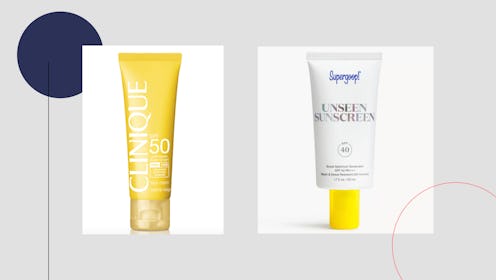Fashion
Here's Exactly How To Tell If Your Sunscreen Is Expired

Skin care lovers already know the importance of sunscreen, but that doesn't mean everyone's an expert. While you may be grabbing a facial sunscreen as part of your routine (which is excellent, good job!), you may still have the same bottle dating back from...well, let's not talk about when. But does sunscreen expire? And if it does, how can you tell if yours belongs in the trash and not on your face?
Bustle reached out to dermatologists and sun care experts for everything you need to know about sunscreen expiration. Turns out, if that bottle has expired, you could be missing out on your SPF's protective benefits. And despite the product having an impressive shelf life, experts say it doesn't mean you should keep using it.
If you've been wondering if your sunscreen is giving you the protection you need, read on for all the details on how to tell when your product has gone bad and what you should look for in a new one as you head out into the sunshine.
We only include products that have been independently selected by Bustle's editorial team. However, we may receive a portion of sales if you purchase a product through a link in this article.
Does Sunscreen Expire?
Yes, sunscreen does expire, but it also has an impressive shelf life. According to Dr. Joshua Zeichner, director of cosmetic and clinical research in dermatology at Mount Sinai Hospital in New York City, sunscreens are regulated by the FDA and considered over-the-counter drugs. "Sunscreens need to go through stability testing, which does give a specific expiration date," he tells Bustle. "Past that date, the company cannot guarantee that the sunscreen will be stable or work as well as it should."
Many skin and beauty products feature a small jar-shaped emblem with the number of months until expiration (such as 6M or 12M). However, you may forget to look at this when you make a purchase, and there's no way to know how long something has been sitting on the shelf. But according to Dr. Zeichner, some sunscreens eliminate the guess work by listing an actual date — that's the first place you should look if you think your product is expired.
How Long Does Sunscreen Last?
Not all sunscreens list an expiration date. Dr. Martha Viera of Flores Dermatology in Coral Gables, Florida, tells Bustle that for products that don't have one listed, three years is the maximum amount of time it can be used. If it was purchased more than three years ago, it's time to throw it out.
Dr. Ziechner cautions, however, that you might not know how long your product was sitting on store shelves before you bought it and, for that reason, usually recommends buying new sunscreen every summer.
How Can You Tell If Your Sunscreen Has Gone Bad?
"Usually if you see changes in color and consistency — like more watery consistency — that is often the first sign that indicates that sunscreen is not good, and you need to change it," says Dr. Viera. (These guidelines apply both to mineral and to chemical sunscreens, FYI.)
Alongside changes in color and texture, Dr. Zeichner adds that a change in smell could also be a sign and to get rid of your product. "When sunscreens are produced, the complete formula is evaluated for stability," he tells Bustle. "The combination of ingredients will give a unique smell to the product. Any changes to that smell, whether it turns rancid, has a foul odor, or has a moldy scent, may mean the integrity of the formula has been compromised. If the product reminds you of the beach when you get it, it should continue to remind you of the beach each time you open it until it reaches its expiration date."
What Should You Look For In A New Sunscreen?
"The best sunscreen is the one you actually use," says Dr. Zeichner, citing the many formulas on the market — from sticks to creams to gels — as a way for everyone to meet their personal preferences. There are, however, a few basics to consider no matter what.
"Look for sunscreens that have at least SPF 30 protection and are labeled as broad spectrum," he tells Bustle. "This means it covers both UVA and UVB rays." While UVA and UVB rays are both forms of ultraviolet light, UVA rays cause skin aging while UVB rays cause burning. Both, though, damage your skin's DNA, which could cause mutations that lead to skin cancer.
Dr. Viera adds that you should look for a product that's compatible with your skin. Generally, she recommends avoiding natural ingredients like coconut, cocoa butter, and soybean oil because, while natural, they can clog pores and then cause breakouts. She also advises those with rosacea or sensitive skin to stay away from products that have fragrance of alcohol in them, which could irritate any existing conditions.
How Can You Make Your Sunscreen Last Longer?
Once you've got your new sunscreen, there are ways to prolong its shelf life, according to Dr. Viera. She says to consider where you stash your product — for example, hot and humid spots could break down your SPF and weaken its ability to combat UV rays.
"Keep it at room temperature," she tells Bustle. "Avoid leaving it in the car or hot surfaces. Sunscreen containers should not be exposed to direct sun. Protect the sunscreen by wrapping the containers in towels or keeping them in the shade."
Experts:
Dr. Joshua Zeichner, director of cosmetic and clinical research in dermatology at Mount Sinai Hospital in New York City
Dr. Martha Viera of Flores Dermatology in Coral Gables, Florida
This article was originally published on